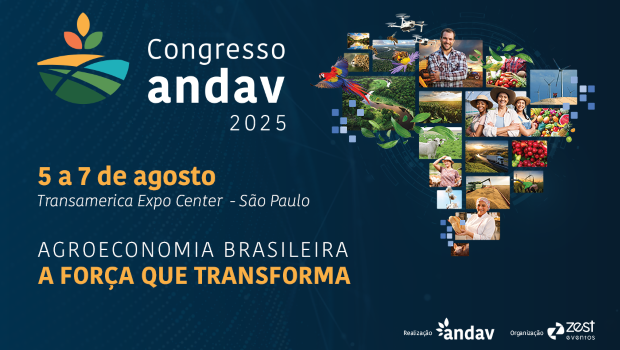ANDAV Congress 2025 Is Strategic Amid Tariff War: “Retaliation Isn’t an Option!”
Publicado em 31/07/2025
 ANDAV Congress 2025 , from August 5th to7th in São Paulo
ANDAV Congress 2025 , from August 5th to7th in São Paulo
Published on July 28th, 2025
Agriconscient Show - Broadcast by Radio Eldorado/Estadão-Brasil
*José Luiz Tejon
Translated / Copydesk by Teacher Francisco Barbosa Bardhal
The largest event bringing together the entire Agricultural and Veterinary input distribution sector in Brazil, will take place in August. It comes through a critical and strategic moment, as Brazil not only exports agribusiness products to the U.S. but also imports inputs from them, before they even reach the farm gates.
I spoke with Mr. Paulo César Tibúrcio Gonçalves, Executive President of ANDAV (National Association of Agricultural and Veterinary Input Distributors), who invited me to the association’s 2025 Congress, and he shared:
"From August 5th to 7th, in São Paulo, Capital, ANDAV Congress 2025 will showcase innovations, solutions, and services driving agribusiness forward. Our main plenary session will bring together experts, leaders, and authorities to discuss the future of distribution in Brazil.
We’ll address strategic topics such as access to credit, global economy, taxation, business management, and innovation.
Additionally, we’ll present key highlights from our National Distribution Survey.
The event will be held at the Transamérica Expo Centre in São Paulo, and more information can be found on our website: www.congressoandav.com.br(http://www.congressoandav.com.br)."
Thanks Mr.Tibúrcio!
This gathering of the distribution sector in early August is strategic because it aligns with the start of planting for Brazil’s major crops. At the same time, key factors must be considered, such as the costs of pesticides, fertilizers, seeds, and the technologies used in Brazil’s agronomic and veterinary practices. A portion of these inputs are imported, either fully assembled/industrialized or as components to be assembled by Brazilian industries.
From the U.S., we import fertilizers such as ammonium nitrate, as well as insecticides, herbicides, fungicides, growth regulators, and even nucleic compounds and sulfonamides.
Regarding agricultural machinery, while we do export to the U.S., we also import components for assembly by American companies established in Brazil and even by domestic manufacturers.
Our trade relationship with the U.S. reveals that we are more often buyers than sellers, resulting in a U.S. surplus of approximately $250 million in total.
Brazil acquires telecommunications equipment from the United States and supports modern agriculture through satellite technology, robotics, and digital management systems, which increases the influence of Big Tech on agribusiness relationships and transactions.
Social media, a topic largely absent from debates until now, actually plays a fundamental role in agribusiness, significantly impacting Brazil’s global agribusiness trade relations. Here comes Big Tech!
In other words, retaliation isn’t feasible! Imposing a 50% tariff on U.S. imports would only increase the costs of preparing Brazilian crops, already under pressure from high interest rates, an unpredictable U.S. dollar, and a major client declaring a trade war.
Therefore, never before has a meeting been so timely and strategic, bringing together the entire distribution trade and services, everything farmers and ranchers need to produce crops and animal protein.
Looking at this moment, through an "Agriconscient" view, it both poses a significant challenge and acts as a stimulus for existing Brazilian initiatives. These are efforts already underway, rooted in the plans and visions of the country's most visionary agribusiness leaders.
The goal is to build a technological and industrial security system for the Brazilian pre-farm gate sectors.
For example, in fertilizers, we have an 85% import dependency as the U.S. accounts for less than 5% of that total, yet it still impacts Brazil’s costs and prices.
So, it’s time to declare, on this August 1st, 2025, a moment of "Independence and Overcoming."
I don’t believe President Trump will stop toying with us, a friendly country, just to stay in the global media spotlight until he finds another "victim."
Actually, behind the curtains, his focus is on China and the Chinese-Asian bloc, a clash between geo-economic superpowers.
Thus, August 1st will be the "point of no return."
Complaining won’t help! As economist Mr. Paulo Rabello de Castro once stated, we need an "Overcoming Agenda" to turn Trump’s sour lemons into tasty lemonade.
I’d even add to Mr. Rabello’s lemonade a delicious "Brazilian Caipirinha", made with our sweet and high-quality sugarcane.
Since President Trump is now even pushing to change Coca-Cola’s formula, why not highlight the world’s best distilled spirit, our Brazilian Cachaça ( that famous Sugar Cane Spirit)?
So, let’s also remember the Brazilian character Zé Carioca (Joe Carioca), created by Walt Disney, starring in the 1942 film "Saludos Amigos", which was introduced to American media as a friendly parrot that would surely say today with his strong, funny accent:
“Oh, Uncle Trump, why are you doing this to me? We are friends, ain´t we?!!!”
My best wishes for success to ANDAV and my friend Mr. Paulo Tibúrcio.
At the start of August, we’ll keep selling!
Retaliation isn’t an option !!!
*Prof.Dr.José Luiz Tejon - PhD in Education Universidad de La Empresa/Uruguay; Academic Director Brazil+Tropical Belt Nations at International Agribusiness MBA Audencia France & Fecap Brazil; Master's degree in Art Education and History of Culture - Mackenzie University; Journalist and Publicist - Harvard, MIT and PACE/USA/ Insead in France; Specialization Academic Coordinator of Master's Science Food & Agribusiness Management at Audencia in Nantes/ France, and FECAP/Brazil; Managing Partner at Biomarketing and TCA International; Professional Head at Agri Anefac; Writer, author and co-author of 37 books; Agri Personality Award 2023/ABAG -100 Most Influential People in Agribusiness; Former director of Grupo Estadão, Agroceres and Jacto S/A; 2025 Award Agriworld Group.
